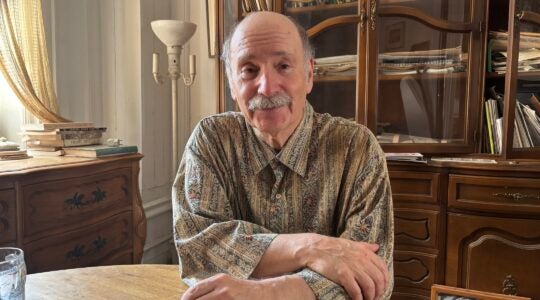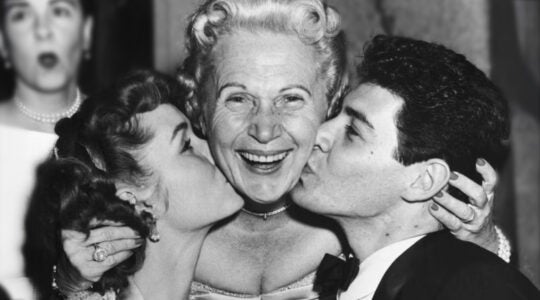Who will speak on behalf of world Jewry in its evolving relationship with the Vatican? Should it fall to a coalition of secular and religious Jewish organizations meeting with stated goals and guidelines?
Or, should every Jewish organization hold its own separate dialogue, without an umbrella group to provide a unified stance, and without accountability to the larger Jewish community?
About a dozen Jewish interfaith experts met for the first time last week to discuss these questions in the midst of a crisis in the Catholic dialogue, following a series of blistering criticisms from Vatican leaders.
After three hours, no resolution was reached, and participants planned to meet again in six weeks.But they did agree that the most crucial issue today for Jewish-Catholic relations is the future of Jerusalem.
The group expressed concern over recent statements by Vatican officials calling for Jerusalem’s holy sites to be placed under international supervision. They agreed to unite to defend Israel’s claims.
"As Israel and the Palestinians prepare for final-status talks, the battle for Jerusalem has already begun involving the world’s major faith communities," declared American Jewish Committee interreligious affairs director Rabbi James Rudin, who called the April 15 emergency summit.
The gathering drew representatives from secular and religious groups including: the Anti-Defamation League; the Jewish Council for Public Affairs; B’nai B’rith International, the Tanenbaum Center for Interreligious Understanding; the Orthodox, Conservative and Reform movements; and the Sternberg Center in London.
The meeting was called after Cardinal Edward Cassidy, president of the Vatican’s Commission on Religious Relations with the Jews, declared last month he was breaking off communication with the umbrella group IJCIC, the International Jewish Coalition for International Consultations, which has served as the key Jewish dialogue partner for the last 30 years.
Cassidy and others charge that IJCIC has become the puppet of the World Jewish Congress and has been bashing Vatican policies surrounding the Holocaust.
Summit participants agreed that there should not be one group to speak for all Jewish organizations, according to observers. Instead, they suggested that individual Jewish groups should continue their independent relationships but consult with one another more often.
Reform Rabbi Gary Breeton-Granatoor called for behind-the-scenes consultations and releasing "statements to the press only when we agree, so as not to damage our collective bargaining position in the dialogue," according to participants at the meeting.
But another observer questioned this attitude."Who are they responsible to?" said the source, who asked not to be named. "Why should the Jewish people rely on self-appointed people meeting behind closed doors?"
Many attendees were disturbed by what they perceived as the Vatican’s desire to name its own partners for dialogue.
The group cited remarks by Cassidy’s aide Father Remi Hoeckman, who chastised secular Jewish groups last week during a ceremony in Vatican City. Hoeckman stated he would prefer to dialogue with Jews from religious organizations.
"Those secular organizations that pretended to be the sole representatives of world Jewry, as far as we are concerned, are not valid partners," Hoeckman reportedly said at a ceremony where New York-area Jews presented Pope John Paul II with a Holocaust-menorah.
"They are campaigning against the Church," he charged.
However Hoeckman praised the menorah presenters, calling them "religious Jews, very interested in sharing a common agenda.
"One of the participating rabbis, New Jersey Rabbi Jack Bemporad, director of the Center for Interreligious Understanding at Ramapo College, defended the Vatican’s attitude and reprimanded Jewish groups for criticism of the Vatican’s Holocaust document, and of its plans to make World War II Pope Pius XII into a saint.
Rabbi Joseph Ehrenkranz, executive director of the Center for Christian-Jewish Understanding at Sacred Heart University, who did not attend the menorah ceremony, also criticized the attitude of Jewish groups toward the Vatican.
"The unwarranted and continuous criticism by some Jewish groups toward the Vatican commission … is not the Jewish way," he said.
Neither rabbi attended Rabbi Rudin’s meeting, nor have they been IJCIC members.
Rabbi Rudin said the feeling at the meeting was that "IJCIC must heal itself."
But no one specified how.
At the heart of the issue is whether the World Jewish Congress is willing to relinquish its control of IJCIC, said one participant.
The question is whether IJCIC members such as the ADL, the AJCommittee and B’nai B’rith are willing to fund the coalition, which is now financially dependent on billionaire Edgar Bronfman’s group.
WJC executive director Elan Steinberg told The Jewish Week Tuesday that a special IJCIC meeting is called for April 29 where he will call for equal funding by the member organizations. "The WJC will no longer pay a disproportionate share," he said.
Steinberg found it ironic that the WJC’s administrative and financial backing (which he called "a service to the community") has been "turned around by some in an accusatory fashion."
He also said a new chairman must be elected, following the death last week of historian Geoffrey Wigoder. Steinberg insisted IJCIC should survive.
"What’s going to be left without an IJCIC-type structure is for the Vatican to have only partial or unformed dialogues."
Eugene Fisher, director of ecumenical affairs for the National Conference of Catholic Bishops, said in the late 1960s, the Vatican "did express interest in having one overall, representative group with which to engage in dialogue with world Jewry. "But in the last several years, they feel that IJCIC has not been functioning adequately to this task."
He said the Holy See also wants to dialogue not only about political issues but religious ones: an approach that presents problems for IJCIC since it includes Orthodox members who believe they should not engage in theological discussions with gentiles.
Fisher said the Vatican is refraining from indicating a forum that might achieve a full range ongoing relationship between the Catholic Church and the Jewish community. "Right now, they are open to anything that can work to achieve a mutually-agreed set of goals and procedures. Patience and openness to new possibilities are called for on both sides at present, I would say."
The New York Jewish Week brings you the stories behind the headlines, keeping you connected to Jewish life in New York. Help sustain the reporting you trust by donating today.




